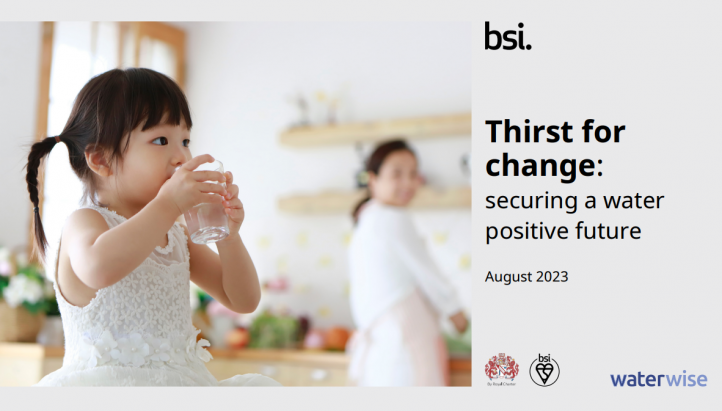Water is one of Earth’s most fundamental and precious resources and the importance of conserving it is real. Thirst for change, a partnership between BSI and leading water NGO Waterwise, explores the global challenge of water availability and how we can collaborate to respond to this. By exploring different approaches to water management, the findings offer key insights and lessons learned from various sectors as well as concrete steps that can drive progress.

It could be easy to believe the only barrier to securing a sustainable future is carbon reduction, given the prominence of the issue and the weight of the challenge. But in fact there are numerous other stresses and strains placed on the environment and society, all of which present an opportunity for us to adapt and respond to them.
Carbon emissions reduction had a starting point and, although we still have a long way to go for all organizations and countries to become net zero, progress has been and continues to be made. This did not happen overnight, and we can learn from it when we identify and address other concerning trends.
Water is one of earth’s most fundamental and precious resources and the importance of conserving it is real.
Currently, while water availability may have been a focus for a long time in regions like the western US or in certain countries, the global conversation about water security appears to be sitting where carbon emissions was more than two decades ago. That’s when organizations began thinking seriously about their role and how they might have been contributing to the acceleration of climate change.
Water stewardship is gaining more attention, with investors and business leaders giving it more focus as it becomes apparent how shortages affect our daily lives as individual consumers, organizations and society as a whole. This is not about moving away from the journey to net zero. In fact, these opportunities are interlinked – carbon emissions and water use impact each other and it is vital that we adapt and respond to them both.
BSI partnered with Waterwise to collate credible, referenced and traceable data related to water availability, water use and water efficiency/wastage from a number of countries. The resulting report covers the UK, US, Japan, China, Australia, France and Germany, noting that these are high water consuming countries, while also looking at the role of specific sectors, including retail, healthcare and the built environment. Where possible the information gathered is comparable between countries. In addition, we have created the BSI Water Security Indicator – a tool created in partnership with Waterwise which is a new high level indicator of how we are using water at a country scale. The Indicator considers seven factors including availability, use, risk and wastage to derive an overall score for each country.
It is important to note that water availability is a serious challenge around the world, not least in the Middle East and North Africa. Access to water in low-income countries, many of which are already heavily impacted by climate change, is a key challenge with geo-political ramifications. This report does not focus on addressing the specific challenges facing these countries but recognizes that addressing water security will need global solutions and collaboration across every country.
N.B. The information contained in this entry is provided by the above supplier, and does not necessarily reflect the views and opinions of the publisher


